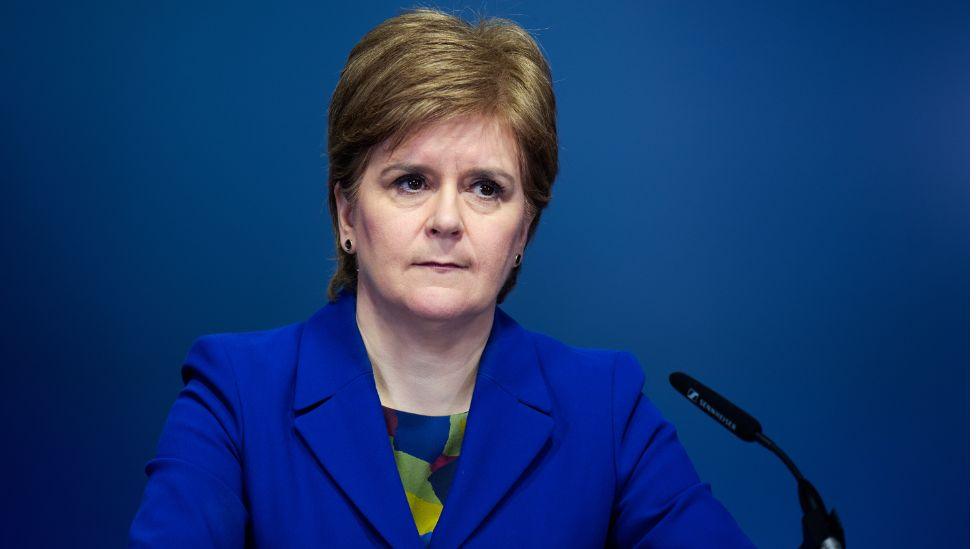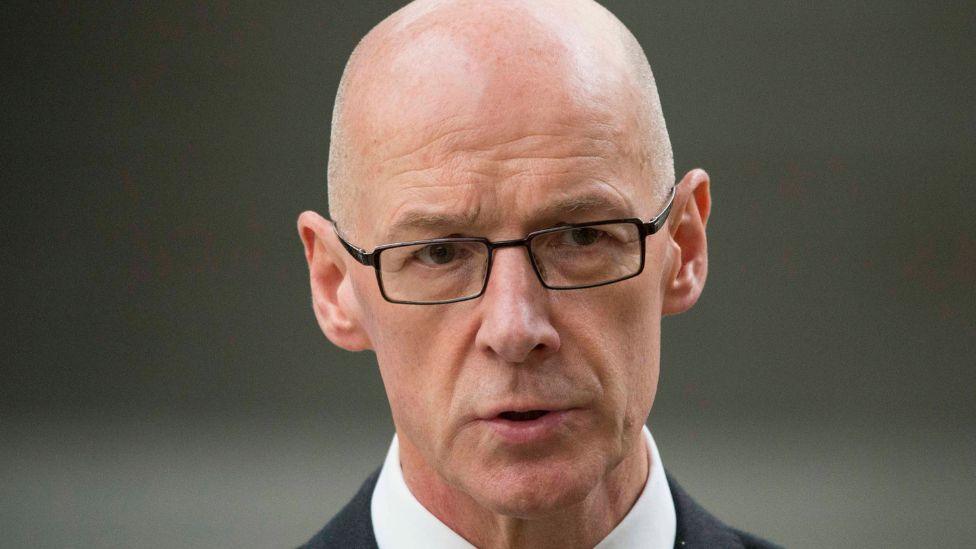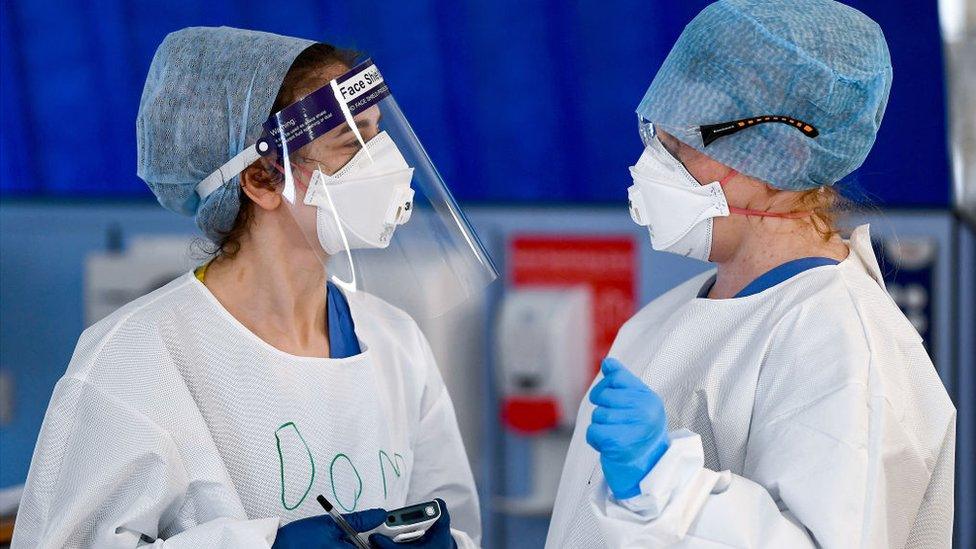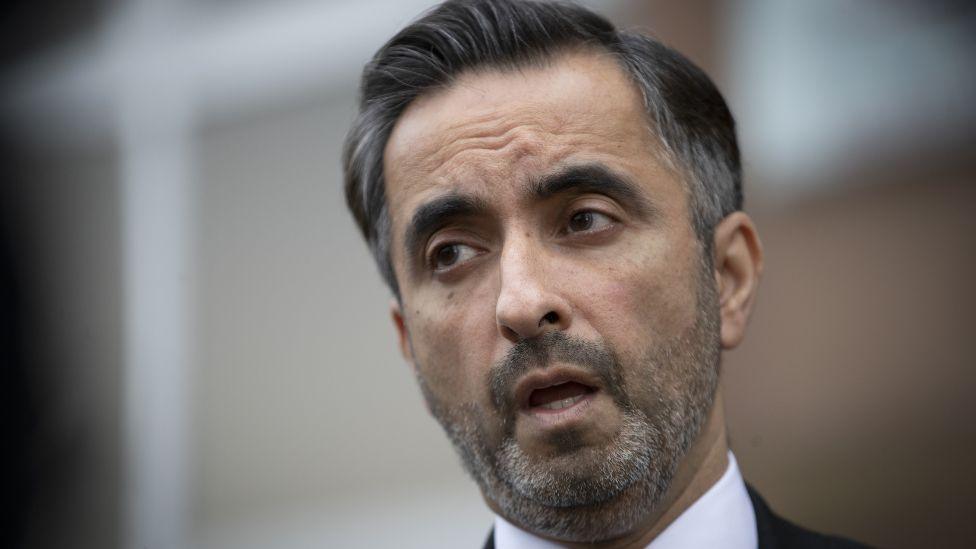Brexit hampered Scotland's pandemic plan, Nicola Sturgeon says
- Published

Former first minister Nicola Sturgeon was giving evidence to the UK Covid inquiry for the first time
Scotland's planning for a pandemic was hampered by preparation for a no-deal Brexit, Nicola Sturgeon has told the UK Covid inquiry.
The former first minister faced questions on how prepared the Scottish government was for the pandemic and how it handled it.
She is expected to appear on more than one occasion, with public hearings set to continue until 2026.
Her former deputy John Swinney is also giving evidence at Thursday's hearing.
Ms Sturgeon agreed that a UK Influenza Pandemic Preparedness Strategy – produced in 2011 following the swine flu outbreak two years before – was inadequate to deal with Covid-19.
But she suggested that a lack of contact tracing and testing capability was more important to Scotland's response to the Covid crisis.
She also said her government clashed with Downing Street during the pandemic over approaches to suppressing the virus.
The inquiry heard that the 2011 strategy – which provided "no set plan" for a non-flu outbreak – was not updated before the Covid crisis.
Ms Sturgeon said such work "suffered" due to planning for a potential no-deal exit from the European Union.
The potential impacts of such a scenario were set out under Operation Yellowhammer documents, which the former first minister said made for "grim and extremely worrying" reading.
"The prospect of a no-deal Brexit and the work that was required across all of the UK governments to plan for Yellowhammer assumptions meant that a significant amount of time, energy and resource was diverted into that from a range of other matters," she told the inquiry.
"We were not at all happy about what we were having to do," Ms Sturgeon said.

Former deputy first minister John Swinney has also spoken to the UK Covid inquiry
The Scottish government, which opposed Brexit, had no choice as a no-deal outcome was a "distinct" possibility in 2019, the former SNP leader told the inquiry.
"Every part of our work was impacted by this and it was a matter of deep regret and frustration for us at the time," she added.
Lead counsel Hugh Keith KC warned Ms Sturgeon that she was in a "witness box" and not on a "soap box" as she was cautioned for making general criticisms of Brexit.
He also questioned why resources were diverted from something as important as planning for a future pandemic.
'Points of difference'
The former first minister warned there was a "real danger" of governments becoming complacent by putting an overemphasis on plans for emergency scenarios.
But she agreed it was "fair" to suggest that had the 2011 plan been updated and developed, Scotland's capability in testing and other areas could have been better prepared for coronavirus.
She said it was "legitimate" to ask whether the government could or should have done more to supress the virus, but insisted her government did not accept "worst-case" forecasts.
"It was never the case that we accepted there was a level of harm that was going to be done by this virus and we were going to accept that," she said.
"It became later on one of the points of difference with the Scottish and the UK government the extent to which we were still seeking to suppress as oppose to live with the virus."

The Scottish government has said distribution of PPE to frontline staff was an issue
Ms Sturgeon was asked about health emergency exercises – Silver Swan in 2015, Cygnus in 2016 and Iris in 2018 – which rehearsed the government's response to pandemics.
Of the 22 recommendations arising out of Exercise Cygnus, which tested the response to a serious influenza pandemic, 14 had been completed at the start of the Covid pandemic.
Ms Sturgeon said some of the recommendations required the UK government to "take the lead on" and she told the inquiry one relating to health and social care was paused due to Brexit planning.
Exercise Iris dealt with the outbreak of MERS and four of 13 recommendations had been completed when the coronavirus pandemic came along, the inquiry heard.
Mr Swinney, the former deputy first minister and Covid recovery secretary, said he had been kept "awake at night" by issues relating to resilience preparation for a pandemic and other potential emergencies.
He said there was "strong evidence of pandemic preparations" by the Scottish government in the lead up to the Covid crisis.
Mr Swinney described a no-deal Brexit as "a very real threat" and said preparation for it, as well as other factors, slowed the implementation of recommendations of exercises Silver Swan, Cygnus and Iris.
He also said Brexit contributed to a "pretty poor" working relations between the Scottish and UK governments.
Aamer Anwar is the solicitor representing the Scottish Covid Bereaved Group, which is made up of family members who lost relatives during the pandemic.

Lawyer Aamer Anwar said bereaved families are angry at politicians
He told BBC Radio's Good Morning Scotland that his clients were left "aghast" and "angry" by the testimony of Scotland's former health minister, Jeane Freeman, to the inquiry on Wednesday.
Ms Freeman said that Scotland's health infrastructure was not equipped to cope with the pandemic and that although PPE supplies came close to running out, stock had always been maintained.
Mr Anwar told Good Morning Scotland: "Our frontline workers were crying out for PPE and a number of them lost their lives."
He said former Scottish ministers would have to explain why the NHS was "on its knees" before the pandemic and why untested patients were sent from hospitals into care homes "to die in".
The lawyer said: "The families watching Ms Sturgeon and Mr Swinney, they are not interested in words of sympathy.
"Those words will be no different to [former UK health secretary] Matt Hancock's, they will be empty words if we do not see the truth and accountability from Scotland's former ministers."
He said families were eager to see WhatsApp and other electronic messages sent by leaders during the pandemic, and that former minister had been told by the inquiry to save any relevant communications.
At First Minister's Questions on Thursday, Humza Yousaf told Scottish Labour leader Anas Sarwar that Scottish government officials have complied with the order from the inquiry.
He said both the UK and Scottish inquiries have decided not to publish details of the requests they have made, and have asked the Scottish government not to share details of any requests to share material.
The inquiry was also scheduled to hear from Dr Catherine Calderwood, the country's former chief medical officer, on Wednesday.
But Dr Calderwood, who quit after breaking her own Covid lockdown rules, will now give evidence on another day.
Baroness Heather Hallett apologised for the cancellation at short notice and said it was "due entirely to unforeseen circumstances".
The inquiry was set up to examine the UK's response to the virus.
It will also look into the impact of the pandemic and the lessons that can be learned for future virus outbreaks.
A separate Scottish inquiry that will look specifically at the impact of the virus north of the border has been hit by delays after its original chairwoman quit for personal reasons and four members of the inquiry's legal team also stood down.
About 227,000 people died in the UK with Covid listed as one of the causes on their death certificate - including more than 17,000 in Scotland - after the first cases were detected early in 2020.
More than 44 million people were estimated to have caught the virus by February 2022.
What is the Covid Inquiry?
It is about going through what happened and learning lessons
No-one will be found guilty or innocent
Any recommendations made do not have to be adopted by governments
The inquiry has no formal deadline but is due to hold public hearings until 2026
Scotland is holding a separate inquiry in addition to the wider UK one